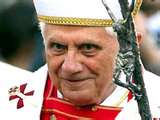Vatican begins talks with ultra-traditionalist rebel group
 Vatican City - The Vatican began talks Monday with representatives of the rebel ultra-traditionalist Society of Saint Pius X (SSPX), nine months after Pope Benedict XVI's controversially pardoned four of the group's bishops, including one who is a Holocaust-denier.
Vatican City - The Vatican began talks Monday with representatives of the rebel ultra-traditionalist Society of Saint Pius X (SSPX), nine months after Pope Benedict XVI's controversially pardoned four of the group's bishops, including one who is a Holocaust-denier.
The talks will attempt to solve doctrinal disputes that stem from the SSPX's rejection of moves modernizing the Catholic church introduced through the so-called Second Vatican Council reform process of the 1960s.
Last month the Vatican announced the members of its delegation at the talks - Swiss Dominican Rev Charles Morerod, the German Jesuit Rev Karl Josef Becker and the Spanish vicar general of Opus Dei, Rev Fernando Ocariz Brana. It did not provide further details.
Benedict has however, made the SSPX's full re-integration into the Church conditional on its members' full acceptance of the Second Vatican Council which among other things sought amicable relations between Catholics, other Christian denominations and religions, including Judaism.
The SSPX's Swiss-born superior general, Bishop Bernard Fellay in remarks made ahead of Monday's talks indicated that negotiations with the Vatican could go on "for years."
In a recent interview with the Chilean newspaper El Mercurio, Fellay also said he believed the Vatican, in an effort to bring the SSPX back into the fold, may offer it the status of personal prelature - a priestly order under direct control of the pope.
Fellay was one of the four SSPX bishops who together with the group's late founder Archbishop Marcel Lefebvre were excommunicated by Pope John Paul II in 1988 after Lefebvre consecrated the four clerics as bishops without papal consent.
The excommunication orders were lifted in January by Benedict who has made church unity one of the chief objectives of his pontificate.
But the pontiff's overture triggered a row in the Catholic church and with Jewish leaders when it emerged that one of the four, British-born Richard Williamson, in a television interview had said he did not believe the Nazis murdered Jews in the gas chambers and also denied the scale of the Holocaust.
Benedict subsequently reiterated the Catholic Church's condemnation of Holocaust denial and in an extraordinary step, admitted the Vatican had made mistakes in handling the Williamson case and more broadly, negotiations with the SSPX.
In June, in what was seen as a rebuff of the Benedict's overtures, the SSPX ordained three priests in Germany despite prior warnings from the Vatican that such action would be considered "illegitimate."
Benedict has stated that SSPX members are to be barred from official roles within the church unless they agreed to fully abide with its teachings.(dpa)